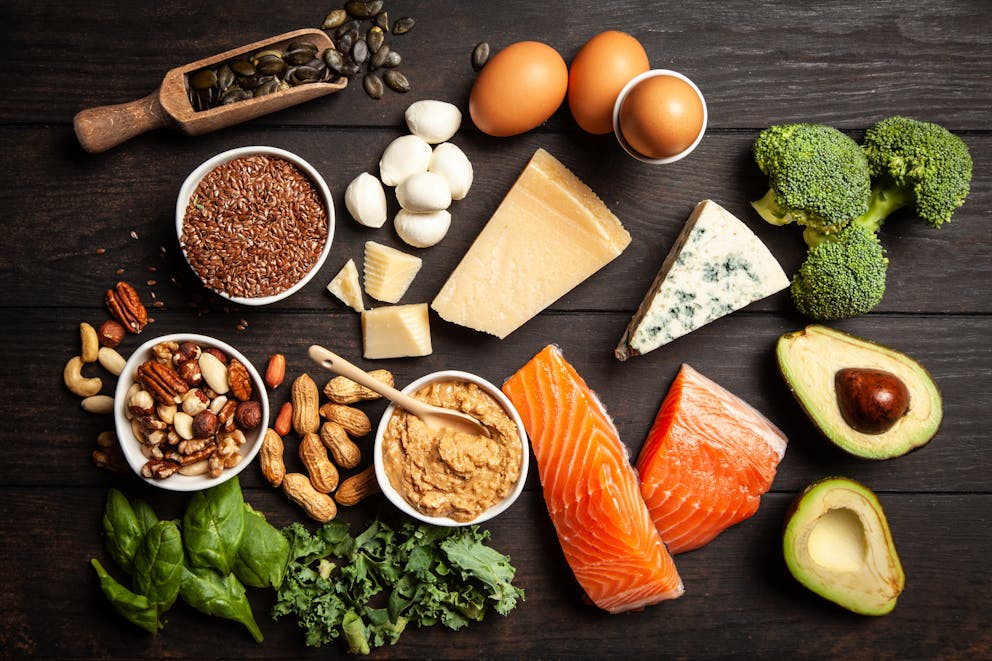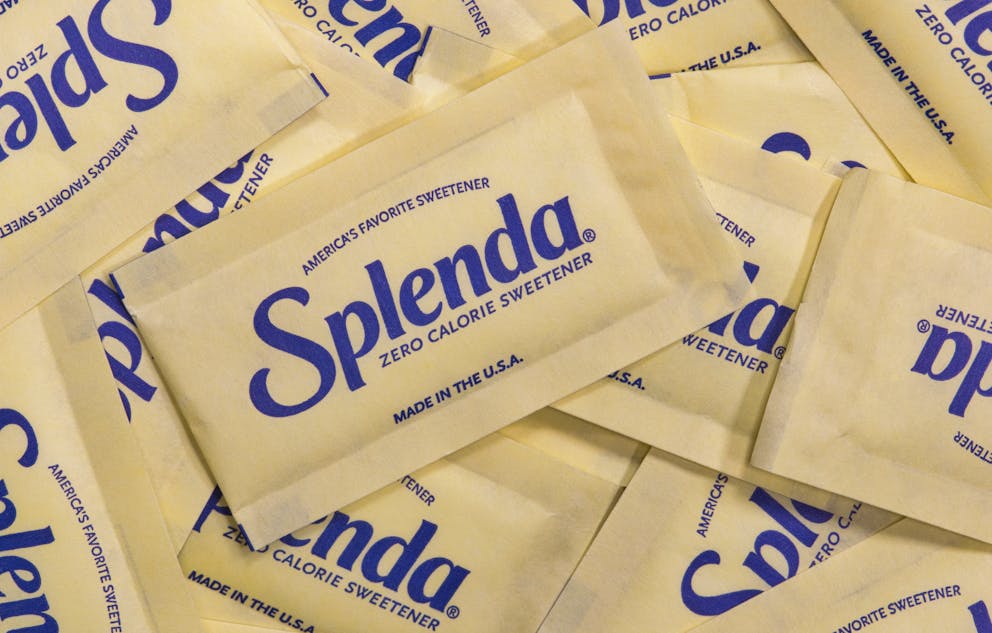Using Monk Fruit Stevia Erythritol and Xylitol
Beginning a keto lifestyle doesn't mean you have to go without the occasional sweet treat.
There are a variety of keto-friendly sweeteners offering low-carb alternatives that won't derail your dietary goals or interfere with ketosis.
Discover keto-friendly sugar alternatives and learn why it's best to avoid aspartame.
Understanding Keto-Friendly Sweeteners
When on a keto diet, sweeteners must be chosen wisely to ensure they don't disrupt the state of ketosis.
Unlike sugar, keto-friendly sweeteners like monk fruit, stevia, erythritol, and xylitol have low or zero glycemic index. This means they won't mess with your ketosis by causing insulin spikes.
The Role of Glycemic Index in Choosing a Sweetener
The glycemic index (GI) measures how much food raises blood glucose levels.
Foods with a high number on the GI lead to sudden changes in blood sugar levels, whereas low GI options don't significantly raise blood sugar and insulin levels.

The Four Best Sweeteners For a Ketogenic Diet
Xylitol: It tastes like sugar but has a GI of only 30 compared to 65 for table sugar.
Erythritol: Known for its cold sweetness without causing an insulin spike.
Monk Fruit: Extremely sweet yet contains no calories or carbs, making it perfect for keto dieters who want something super-sweet without any guilt attached.
Stevia: Another natural alternative with zero glycemic impact that can be added to various beverages like flavored water or carbonated drinks without increasing insulin levels. Seek out stevia that still has its natural green color and has not been bleached white.
Xylitol
If you're searching for a sweetener that's a close match to sugar, xylitol is your best bet.
This natural substitute, derived from birch bark or corn cobs, has a similar sweetness level to sugar but with fewer calories and carbs.
The Benefits of Non-GMO Birch Bark-Derived Xylitol
Birch bark-derived xylitol is considered superior due to its non-GMO status.
It's also fiber-rich and has been shown to have dental benefits, such as reducing cavities and tooth decay. This makes it not only keto-friendly but beneficial for overall health, too.
Xylitol Gum
Keto dieters often struggle with bad breath during the early stages of ketosis.
Chewing on xylitol gum can help freshen your breath while keeping you within your carb limits.
Stevia
Looking for a natural sweetener that won't ruin your keto diet? Stevia is the answer.
This plant-based sugar substitute has zero calories and won't affect your blood glucose or insulin levels.
Some people find stevia's aftertaste weird but don't worry. Mix stevia with other keto-friendly sweeteners like erythritol or monk fruit extract to create a flavor that you love. Experiment with different combos until you find your perfect match.
Health Benefits of Stevia
Stevia isn't just great for keto - it may also help lower blood pressure and reduce inflammation.
So, if you're looking for a natural way to satisfy your sweet tooth while staying true to your keto lifestyle, try stevia. Be sure to look for brands that do not bleach stevia, but instead allow it to retain its natural green color.
Monk Fruit
If you're searching for a super-sweet, natural alternative to sugar that won't kick you out of ketosis, monk fruit might be your best bet.
This small green melon native to southern China is known for its intense sweetness - estimated to be about 200 times sweeter than sugar.
The beauty of monk fruit lies in its zero glycemic impact. Because it doesn't raise insulin levels, monk fruit sweetener is ideal for those on a ketogenic diet or trying to regulate their blood sugar.
However, while monk fruit sweetener has many benefits, there are also some aspects that people may dislike.
The most notable one is the aftertaste, which can be distinctive and not everyone's cup of tea. Once you've become accustomed to its unique flavor profile, monk fruit sweetener may quickly become your favorite sugar substitute.
Erythritol
If you're looking for a sweetener that won't affect your insulin levels, erythritol might be the perfect fit.
This sugar alcohol is derived naturally from fruits and fermented foods, and it's known for its unique cold sweetness. It's almost as sweet as regular sugar but with only 5% of the calories.
Erythritol has gained popularity among those following a ketogenic diet due to its zero glycemic impact. This means it doesn't cause any increase in blood glucose or insulin levels post-consumption, making it an ideal choice for people trying to maintain ketosis.
However, sourcing non-GMO erythritol can be tricky since most commercial versions are made from GMO corn. Therefore, always ensure to check labels carefully when purchasing this sweetener.
Potential Digestive Issues With Certain Sweeteners
For those seeking to enjoy sweet treats without the sugar rush, erythritol and xylitol may provide an ideal solution - though care should be taken to avoid digestive distress.
Consuming too much of these sugar alcohols can lead to some unpleasant digestive issues.
How much is too much? Recommended daily limits
The FDA advises a maximum of fifty grams of erythritol and forty of xylitol daily.
But individual tolerance can vary greatly, so start small and work your way up, as these sweeteners can have laxative effects.
And if you thought that was bad, these sweeteners can also cause gas production and lead to bloating, flatulence, stomach cramps, or diarrhea.
Choose a suitable sweetener and pay attention to how much you use at once. And if you're still experiencing discomfort, consider trying other options like stevia or monk fruit.

Avoiding Artificial Sweeteners Like Aspartame and Splenda
Artificial sweeteners like aspartame and Splenda may seem sweet, but they have a bitter aftertaste.
These substitutes have zero calories but can have a significant impact on your health.
Health Risks Associated With Consuming Aspartame
Aspartame, a common ingredient in diet sodas and sugar-free products, has been linked to several health concerns.
Studies have linked aspartame consumption to a range of health risks, such as headaches, digestive issues, mood disorders, and even certain cancers.
The FDA considers aspartame safe for general use but recommends that people with phenylketonuria (PKU), a rare genetic disorder, should avoid it because they can't metabolize one of its components effectively.
Instead of artificial sweeteners, opt for natural keto-friendly sweeteners like stevia or monk fruit. These options have no impact on insulin levels or blood glucose control.
In contrast, consuming artificial sweeteners might lead you down the path of metabolic syndrome and type 2 diabetes. Gut microflora can be disrupted by ingesting artificial sweeteners, resulting in a false signal that sugar is being consumed when it is not.
If you're following a ketogenic diet or simply trying to reduce your sugar intake for better health outcomes, steer clear of artificial alternatives like aspartame.
Conclusion
Regarding keto-friendly sweeteners, xylitol, stevia, monk fruit, and erythritol are the best options for a low glycemic index and no insulin spikes.
However, be careful not to consume too much of these sweeteners, as they may lead to digestive issues, and always follow recommended daily limits.
And don't forget to avoid artificial sweeteners like aspartame due to associated health risks.
Previous blog
Can You Chew Gum on Keto?Next blog
Sugar and Carb Cravings on KetoTags

Popular
08/31/2023
11.6K views
08/31/2023
14.6K views
08/31/2023
145.6K views
03/18/2024
11/21/2022




